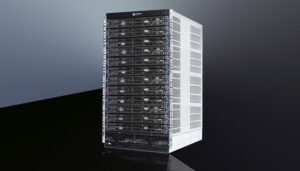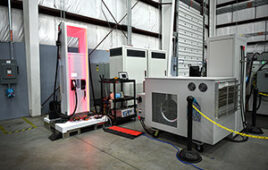From Lawrence Livermore National Laboratory
The U.S. Department of Energy’s (DOE) National Nuclear Security Administration (NNSA) announces the award of an $18 million contract to Cornelis Networks for collaborative research and development in next-generation networking for supercomputing systems at the NNSA laboratories.

Technologies developed through the Next-Generation High Performance Computing Network project are expected to support mission-critical applications for HPC, artificial intelligence and machine learning (AI/ML), and high-performance data analytics. Applications could include stockpile stewardship, fusion research, advanced manufacturing, climate research and other open science on future ASC HPC systems. Photo courtesy of Cornelis Networks.
The Next-Generation High Performance Computing Network (NG-HPCN) project for the NNSA’s Advanced Simulation and Computing (ASC) program will enable NNSA to co-design and partner with Cornelis on development and productization of next-generation interconnect technologies for high performance computing (HPC). The project is led by Lawrence Livermore National Laboratory (LLNL) for the NNSA Tri-Labs: LLNL, Los Alamos and Sandia National Laboratories.
The resulting networking technologies are expected to support mission-critical applications for HPC, artificial intelligence and machine learning (AI/ML) and high-performance data analytics. Applications could include stockpile stewardship, fusion research, advanced manufacturing, climate research and other open science on future ASC HPC systems.
“We are pleased to be partnering with Cornelis Networks to co-develop advanced networking technologies which we anticipate will be well-suited for the needs of the ASC program in the coming years,” said NNSA ASC program director Thuc Hoang. “As we move into exascale supercomputing and beyond, and increasingly rely on emerging technologies to achieve our mission objectives, we will need creative high-performance solutions to meet future challenges.”
The contract is part of the ASC post-Exascale-Computing-Initiative (ECI) investment portfolio, whose objective is to sustain the technology research and development momentum and strong engagement with industry that the DOE ECI had initiated via its PathForward program. It also will help foster a more robust domestic HPC ecosystem by increasing U.S. industry competitiveness in next-generation interconnect technologies.
“We expect this contract will have an impact on future ASC Advanced Technology and Commodity Technology Systems at the NNSA labs and allow us to make key improvements in ASC application network performance,” said Matt Leininger, senior principal HPC strategist at LLNL. “The NG-HPCN collaboration with Cornelis will enable the co-design of next-generation networks targeted towards NNSA’s scientific and engineering workloads.”
Representatives from Cornelis Networks said the funding will be used to collaborate with the NNSA laboratories to accelerate development of network simulation capabilities and highly performant adapter and switching technologies — including advanced features and in-network intelligence — and to enable open-source host software based on OpenFabrics Interfaces.
“The Cornelis team is thrilled to partner with the NNSA in co-development of our future fabric products through their Next-Generation High Performance Computing Network project,” said Gunnar K. Gunnarsson, vice president of Solutions Delivery and Support at Cornelis. “We look forward to accelerating scientific advancements across a variety of applications by delivering industry-leading performance in support of the NNSA’s mission-critical HPC and AI workloads.”
For more information, click here.





Tell Us What You Think!